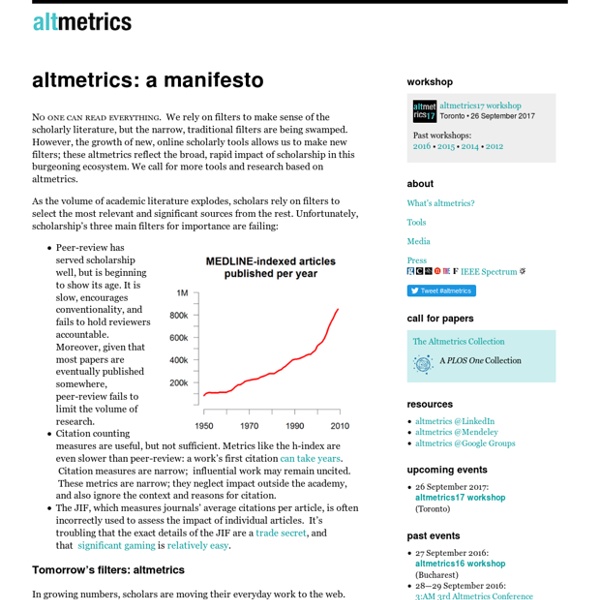31 Flavors of Research Impact through #altmetrics
The impact of a research paper has a flavour. It might be champagne: a titillating discussion piece of the week. Or maybe it is a dark chocolate mainstay of the field. Strawberry: a great methods contribution.
Another publisher accuses a librarian of libel
With the proliferation of scholarly journals – particularly open-access Internet journals that charge author fees – some librarians consider themselves on the front lines of the fight to preserve quality publishing. The weapon of choice for some, including Jeffrey Beall, associate professor and scholarly initiatives librarian at the University of Colorado Denver? The blog. But some publishers have taken up their own arms – including threats of lawsuits – in defense, raising questions about academic freedom and librarians in the Internet age. Via its lawyer earlier this month, the Canadian Center for Science and Education, publisher of numerous open-access journals charging several-hundred dollar author fees, sent a letter to Beall informing him that his inclusion of the company and several of its products on a list of a possible-to-probable “predatory” journals on his blog amounted to defamation and libel. No court date has been set for that case.
When to Act on a Correlation, and When Not To - David Ritter
by David Ritter | 11:00 AM March 19, 2014 “Petabytes allow us to say: ‘Correlation is enough.’” - Chris Anderson, Wired Magazine, June 23, 2008 The sentiment expressed by Chris Anderson in 2008 is a popular meme in the Big Data community. “Causality is dead,” say the priests of analytics and machine learning. They argue that given enough statistical evidence, it’s no longer necessary to understand why things happen – we need only know what things happen together.
For Scholars, Web Changes Sacred Rite of Peer Review
Now some humanities scholars have begun to challenge the monopoly that peer review has on admission to career-making journals and, as a consequence, to the charmed circle of tenured academe. They argue that in an era of digital media there is a better way to assess the quality of work. Instead of relying on a few experts selected by leading publications, they advocate using the Internet to expose scholarly thinking to the swift collective judgment of a much broader interested audience. “What we’re experiencing now is the most important transformation in our reading and writing tools since the invention of movable type,” said Katherine Rowe, a Renaissance specialist and media historian at Bryn Mawr College. “The way scholarly exchange is moving is radical, and we need to think about what it means for our fields.” Mixing traditional and new methods, the journal posted online four essays not yet accepted for publication, and a core group of experts — what Ms.
Altmetrics – Alternative Metrics for Articles (think: impact 2.0) « Kresge Physical Sciences Library
March 30, 2012 by Jane Quigley Altmetrics are metrics that attempt to capture the impact of scholarly publications as reflected in non-traditional media, – social media like blogs, Twitter, and Mendeley. Traditional works of published scholarship (articles, journals, and scholarly monographs) have citation metrics such as impact factors that reflect their impact in specific, carefully defined venues – the number of times cited by other published articles, for example. Increasingly, however, published works of scholarship are causing ripples in social media, – scholarly blogs, Twitter and the like, – that can be tracked and quantified: altmetrics.
Scholarly Open Access
Open-Access Publisher Launches with 355 New Journals January 15, 2013 Template city We recently learned of the launch of one of the largest scholarly open-access publishers. It’s called Academic and Scientific Publishing, and it launched with an amazing 355 journal titles. Read the rest of this entry »
Big Data: Dead By Definition, Alive In Practice
There's a gap between what big data means on paper and what it really means to a business. Big data is at a crossroads. On one hand, big data is dead, the term having been used so often that it's been stripped of tangible value. On the other hand, big data has never been so alive, as more companies than ever are trying to improve so-called big data analytics. How can such a dichotomy exist?
Caring for Digital Content Mapping International Approaches
First published in 2013 by the Royal Irish Academy© NUI Maynooth, Trinity College Dublin, and the Royal Irish AcademyWhen citing this report please use the following citation: O’Carroll, A., Collins, S.,Gallagher, D.,Tang, J., &Webb, S. (2013)



